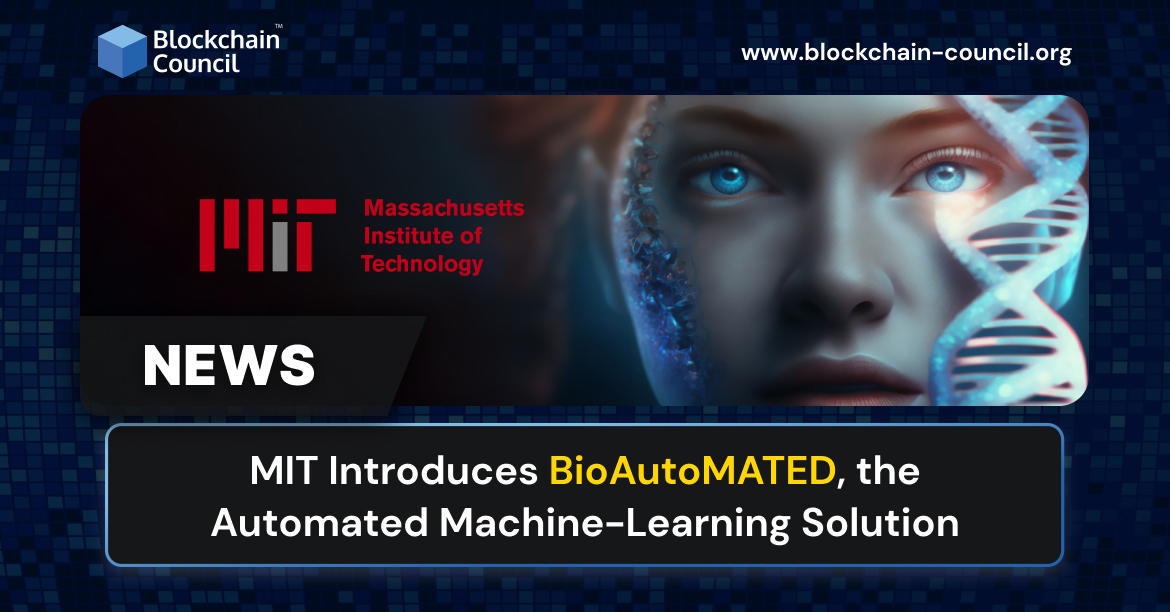
- Blockchain Council
- July 14, 2023
Scientists at the Massachusetts Institute of Technology (MIT) have unveiled a groundbreaking tool that has the potential to transform the field of biology by combining the power of artificial intelligence (AI) with the intricacies of biological research. Known as BioAutoMATED, this automated machine-learning system is designed to accelerate and democratize the development of machine-learning models specifically tailored for biological datasets.
The traditional process of building machine-learning models for biological research has long been a time-consuming and resource-intensive endeavor. However, MIT’s team, led by Jim Collins, the Termeer Professor of Medical Engineering and Science, recognized the need for a more efficient and accessible solution. Their work, published in an open-access paper in Cell Systems, details the development of BioAutoMATED and its potential to revolutionize the way researchers work with biological data.
Also read:Google & Bard AI Chatbot Excels in Mathematics and Coding Skills, Sets New Standards
One of the main challenges in applying machine learning to biology lies in the preparation and transformation of datasets. Formatting the data, selecting appropriate models, and fine-tuning them often consume a significant portion of project time, making the process daunting for researchers without expertise in machine learning. BioAutoMATED aims to address these challenges by automating the entire process, from model selection to data preprocessing, saving researchers valuable time and effort.
The unique aspect of BioAutoMATED lies in its understanding of the fundamental language of biology—sequences. Biological sequences, such as DNA, RNA, proteins, and glycans, possess standardized properties similar to an alphabet. The researchers harnessed this insight to extend existing automated machine-learning tools, typically used for text, to handle biological sequences. This novel approach allows for a more comprehensive exploration of model options, overcoming the limitations of individual automated machine-learning tools.
BioAutoMATED boasts a repertoire of supervised machine-learning models that cater to various types of biological datasets. It offers binary classification models for dividing data into two classes, multi-class classification models for dividing data into multiple classes, and regression models for fitting continuous numerical values or measuring key relationships between variables. Additionally, BioAutoMATED assists researchers in determining the amount of data required for effective model training, ensuring optimal performance.
One of the key advantages of BioAutoMATED is its suitability for a wide range of biological datasets. It can handle smaller, sparser datasets as well as more complex neural networks, making it an ideal tool for research groups working with novel or challenging data. By streamlining the machine-learning process and minimizing barriers to entry, BioAutoMATED empowers researchers to conduct preliminary experiments and evaluate the feasibility of employing a machine-learning expert for further model development.
Also read: HUL Uses AI to Predict Trends and Turnovers
Collaboration and accessibility are central to the vision behind BioAutoMATED. The researchers have made the system’s open-source code readily available, encouraging scientists to use, improve, and collaborate on its development. Their goal is to foster a community-driven approach to refining BioAutoMATED and making it a versatile tool for the broader biological research community. By merging the rigorous practices of biology with the rapid advancements of AI and machine learning, BioAutoMATED has the potential to propel scientific progress in previously unexplored directions.
Funding for this innovative project has come from various sources, including the Defense Threat Reduction Agency, the Defense Advanced Research Projects Agency SD2 program, the Paul G. Allen Frontiers Group, and the Wyss Institute for Biologically Inspired Engineering. Additional support has been provided through fellowships, scholarships, and grants, further highlighting the significance of BioAutoMATED’s potential in revolutionizing biology.
MIT’s introduction of BioAutoMATED marks a significant milestone in the realm of automated machine learning for biology. This powerful tool has the capacity to streamline and accelerate biological research by simplifying the model-building process and enabling researchers to leverage the capabilities of machine learning without extensive expertise. With its user-friendly interface, broad applicability, and emphasis on collaboration, BioAutoMATED opens up new possibilities for scientific breakthroughs at the intersection of biology and AI, paving the way for transformative discoveries in the field.
Also read: Exploring the Contribution of Humans.ai in the AI World





































































 Guides
Guides News
News Blockchain
Blockchain Cryptocurrency
& Digital Assets
Cryptocurrency
& Digital Assets Web3
Web3 Metaverse & NFTs
Metaverse & NFTs
